(完整word版)香港朗文4A总结U1-U7
- 格式:doc
- 大小:27.84 KB
- 文档页数:6
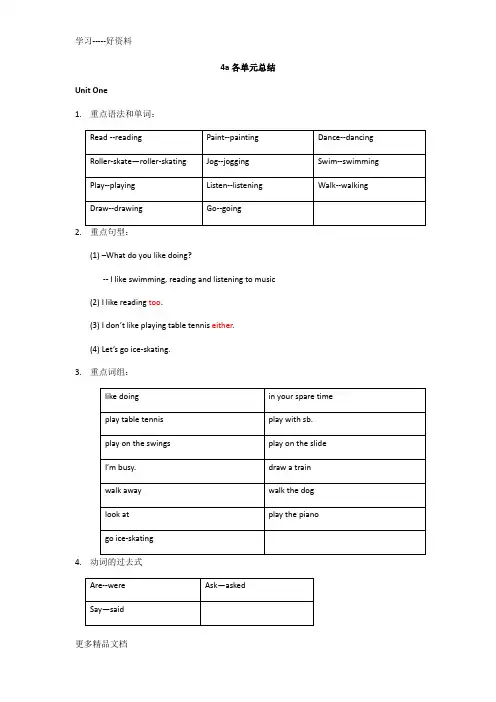
4a各单元总结Unit One1.重点语法和单词:2.重点句型:(1) –What do you like doing?-- I like swimming, reading and listening to music(2) I like reading too.(3) I don’t like playing table tennis either.(4) Let’s go ice-skating.3.重点词组:4.动词的过去式Unit two1.重点语法和单词:2.重点句型:(1)--Do you ever tidy your room?-- Yes, I usually tidy my room.(2)—Does she ever play the violin?-- No, she never plays the violin.-- No, she doesn’t play the violin.3.重点词组:4.动词的过去式Unit Three1.重点语法:2.重点单词和词组:3.重点句型:(1)--Was there any cola when you were young?-Yes, there was.(2)The game I like best was marbles.(3)How do you play marbles?(4)– Did you wear trainers fifty years ago?--Yes, I did.(5)—Did you have a telephone?-- No, I didn’t. Rich people had telephones at home but poor people didn’t. (6 ) – Did you shop at the supermarket?--- No, I didn’t. There weren’t any supermarkets.(7) – Did you go to school?-- No, I didn’t. Rich children go to school but poor children didn’t.(8) –Did you listen to the radio?-- Yes, I did.Where(哪里)do you like going to in your holiday?How(如何)do you help at home?How much (多少钱,提问不可数名词)is it? --- It is five dollars. How many (多少,提问可数名词)books in your home?What time(什么时间)is it?What(什么)are you doing now? ----I am doing my homework. What(什么)is the weather like today? ----It’s windy.What color (什么颜色)is it? ---- It is red.What (什么)are you? ( What do you do?) -----I am a driver.When(什么时候)is your birthday? ---on 2nd MayHow old(多大)are you? ----I am ten.Who (谁) are you? -----I am David.Which(哪一个) club do you want to join?Why(为什么)do you like playing football?----Because I like being healthy.。
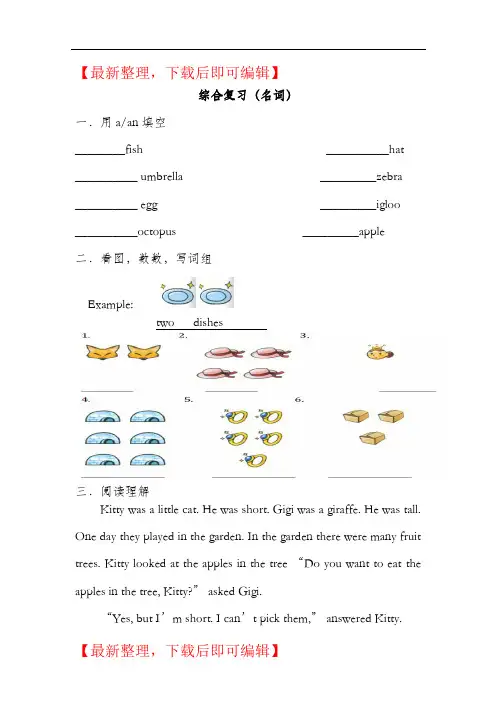
【最新整理,下载后即可编辑】综合复习(名词)一.用a/an填空________fish __________hat__________ umbrella _________zebra__________ egg _________igloo__________octopus _________apple 二.看图,数数,写词组Example:two dishes三.阅读理解Kitty was a little cat. He was short. Gigi was a giraffe. He was tall. One day they played in the garden. In the garden there were many fruit trees. Kitty looked at the apples in the tree “Do you want to eat the apples in the tree, Kitty?” asked Gigi.“Yes, but I’m short. I can’t pick them,” answered Kitty.“Let me help you. I’m much taller than you,” said Gigi.“OK,” said Kitty.Then Gigi picked the apples in the trees and threw to Kitty. And Kitty put the apples into the basket.“Don’t pick too many apples. Now the basket is full,” said Kitty. “Shall we eat them now?”“No, Kitty. The apples are dirty. Go and wash them first,” said Gigi.( ) 1. Kitty and Gigi were in the garden.( ) 2. Kitty wanted to have the pears in the trees.( ) 3. Gigi was tall, he could pick the apples.( ) 4. Kitty carried the apples to his home.( ) 5. They ate the apples before they wash them.四.读绘本的心得,不少于10句话五.完型填空Today we have 1 new students in 2 school. 3 are Chinese.4 names are Liu Mei and Liu Fang.5 twins. They6 the same.7 in Class One, Grade One. 8 is Liu Mei? 9 is Liu Fang? Oh, they are over 10 .( )1.A. one B. two C. three D. four( )2.A. my B. your C. our D. we( )3.A. they B. we C. They D. We( )4.A.They B. My C. His D. Their( )5.A. They’re B. He’s C. We D. Their ( )6.A. see B. look C. is D. are ( )7.A. We B. Its C. They’re D. These ( )8.A. She B. That C. He D. Who( )9.A.Who B. He C. She D. That( )10.A. here B. at C. there D. in家庭作业部分一.阅读理解The Smiths like to go out for a trip on Sundays. This Sunday they want to go to the West Hill. Jack and Mike, the sons, get up very earlyin the morning. Jack puts on a shirt and jeans, and Mike puts on a T-shirt and jeans. They also put on their running shoes. After they help their mother do the housework around the house, they put bread, meat, eggs and some fruit in a basket and carry it to the car. Mrs Smith also takes four tins of coke with her. The little dog is running after her. It wants to go with them, too. They are all very happy.( ) 1. On Sundays the Smiths like _____.A. to stay at homeB. to watch TVC. to go out for a tripD. to do shopping( ) 2. Jack and Mike wear ____.A.jeans and running shoesB. coats and trousersC. jackets and jeansD. jackets and coats( ) 3. They take with them ___.A. some apples and orangesB. some bananas and pearsC. some meat and breadD. some food and books( ) 4. They can have ___________ each.A. two tins of cokeB. a tin of cokeC. four tins of cokeD. three tins of coke( ) 5. What’s the best title for the passage?A. The SmithsB. The West HillC. ClothesD. A Trip二.用适当的形式填空1.apple2.icecream3.banana4.hour5.horse6. two (watch)7.three (dish) 8. four (potato)9. four (fox) 10. ten (knife)11. five (leaf) 12.six(deer)13. (this)are some trees and (that)are some apple trees.。
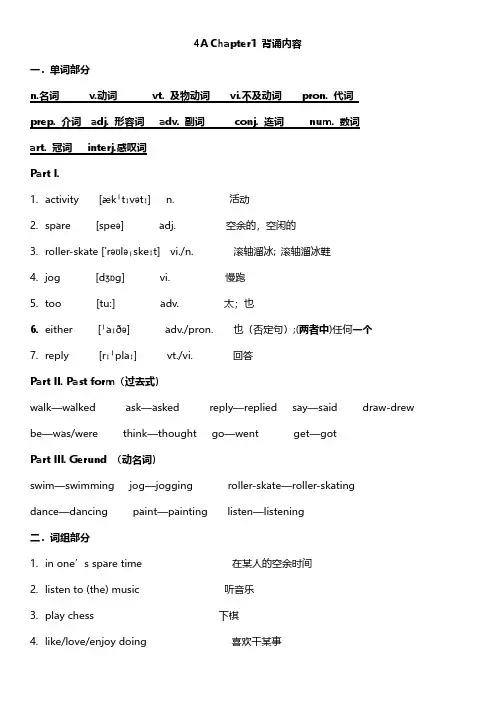
4A Chapter1 背诵内容一.单词部分n.名词v.动词vt. 及物动词vi.不及动词pron. 代词prep. 介词adj. 形容词adv. 副词conj. 连词num. 数词art. 冠词interj.感叹词Part I.1.activity [ækˈtɪvətɪ] n. 活动2.spare [speə] adj. 空余的,空闲的3.roller-skate ['rəʊləˌskeɪt] vi./n. 滚轴溜冰; 滚轴溜冰鞋4.jog [dʒɒg] vi. 慢跑5.too [tu:] adv. 太;也6.either [ˈaɪðə] adv./pron. 也(否定句);(两者中)任何一个7.reply [rɪˈplaɪ] vt./vi. 回答Part II. Past form(过去式)walk—walked ask—asked reply—replied say—said draw-drew be—was/were think—thought go—went get—gotPart III. Gerund (动名词)swim—swimming jog—jogging roller-skate—roller-skating dance—dancing paint—painting listen—listening二.词组部分1.in one’s spare time在某人的空余时间2.listen to (the) music 听音乐3.play chess 下棋4.like/love/enjoy doing 喜欢干某事5.go swimming (去)游泳6.go jogging (去)慢跑7.go roller-skating (去)溜冰8.make a new friend named Tom 交了一个叫汤姆的朋友9.in fact=as a matter of fact= actually 事实上10.i n the gym 在体育馆11.i n the fitness club 在健身俱乐部12.i ndoor stadium 室内体育馆13.d ance flamingo 跳弗莱明哥14.p erform ballet 跳芭蕾15.f inish doing 完成某事/干某事16.p ractise sth./doing 练习某事/干某事17.b e good at sth./doing 擅长于某事/干某事18.b e poor at sth./doing 不擅长于某事/干某事19.b e interested in sth./doing 对干某事/干某事感兴趣20.b e afraid of sth./doing 害怕某事/干某事21.a detective story called Conan 一个叫作《科南》的侦探故事22.o ne of the most famous artists 著名的画家之一(一位著名的画家)23.a t the weekend/at weekends/on the weekend 在周末24.a middle-aged woman 一位中年妇女25.o n weekdays 在工作日,平日26.b e busy with sth. 忙于某事27.b e busy doing 忙于干某事28.b e important to sb. 对某人而言是重要的29.e njoy the fresh air and the beautiful moments 享受新鲜的空气与美妙的时光30.e njoy oneself= have a good time 某人玩得很开心31.a family helper 一位家庭帮手32.s end and pick up kids 接送小孩33.p lay the piano/violin 弹钢琴,拉小提琴(西洋乐器名词前加the )34.p lay Erhu 拉二胡(民族乐器前无the)35.p lay table tennis 打羽毛球(球类名词前无the)36.p lay on the swings/slide 在秋千(滑滑梯)上玩37.p lay with sb. 与某人一起玩38.p lay with sth. 玩耍某物39.a bit later 一会儿以后40.w alk away sadly 难过地走开了41.w alk the dog 溜狗42.w alk home=go home on foot 走回家43.g o home =go back home 回家44.g et home=arrive home 到家45.a fter that 在那以后46.t he black notes (钢琴上)黑键47.s ee sb. doing 看到某人在干某事(强调片断)三.句子部分Part I.1.What do you like doing? 你喜欢干什么?2.I like doing…,too/as well. 我也喜欢做某事。
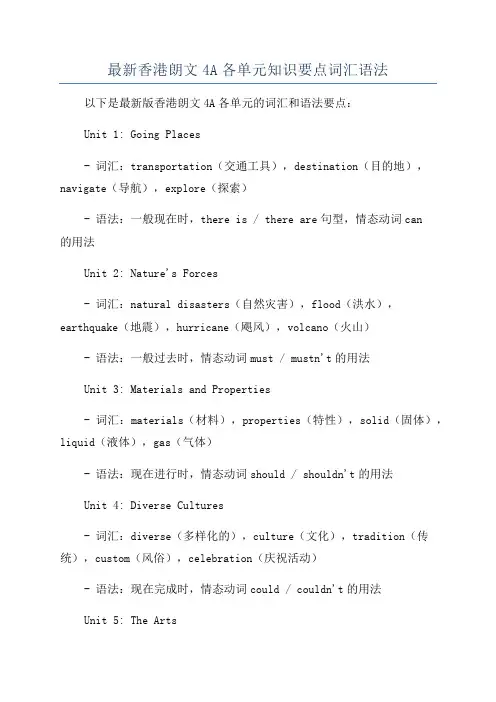
最新香港朗文4A各单元知识要点词汇语法以下是最新版香港朗文4A各单元的词汇和语法要点:Unit 1: Going Places- 词汇:transportation(交通工具),destination(目的地),navigate(导航),explore(探索)- 语法:一般现在时,there is / there are句型,情态动词can的用法Unit 2: Nature's Forces- 词汇:natural disasters(自然灾害),flood(洪水),earthquake(地震),hurricane(飓风),volcano(火山)- 语法:一般过去时,情态动词must / mustn't的用法Unit 3: Materials and Properties- 词汇:materials(材料),properties(特性),solid(固体),liquid(液体),gas(气体)- 语法:现在进行时,情态动词should / shouldn't的用法Unit 4: Diverse Cultures- 词汇:diverse(多样化的),culture(文化),tradition(传统),custom(风俗),celebration(庆祝活动)- 语法:现在完成时,情态动词could / couldn't的用法Unit 5: The Arts- 词汇:artistic(艺术的),creative(创造性的),performance(表演),sculpture(雕塑),painting(绘画)-语法:一般将来时- 语法:过去进行时,情态动词may / must的用法以上是最新香港朗文4A各单元的词汇和语法要点。
请注意,这些要点可能会因版本差异而有所变化,建议参考最新教材或教师的指导。
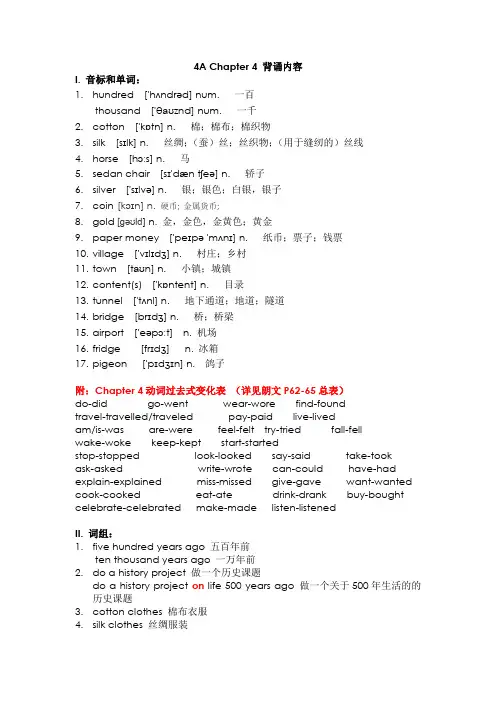
4A Chapter 4 背诵内容I. 音标和单词:1.hundred ['hʌndrəd] num. 一百thousand ['θaʊznd] num. 一千2.cotton ['kɒtn] n. 棉;棉布;棉织物3.silk [sɪlk] n. 丝绸;(蚕)丝;丝织物;(用于缝纫的)丝线4.horse [hɔːs] n. 马5.sedan chair [sɪ'dæn tʃeə] n. 轿子6.silver ['sɪlvə] n. 银;银色;白银,银子7.coin[kɔɪn] n. 硬币; 金属货币;8.gold [ɡəʊld]n. 金,金色,金黄色;黄金9.paper money ['peɪpə 'mʌnɪ] n. 纸币;票子;钱票10.village ['vɪlɪdʒ] n. 村庄;乡村11.town [t aʊn] n. 小镇;城镇12.content(s) ['kɒntent] n. 目录13.tunnel ['tʌnl] n. 地下通道;地道;隧道14.bridge [brɪdʒ] n. 桥;桥梁15.airport ['eəpɔːt] n. 机场16.fridge [frɪdʒ] n. 冰箱17.pigeon ['pɪdʒɪn] n. 鸽子附:Chapter 4动词过去式变化表(详见朗文P62-65总表)do-did go-went wear-wore find-foundtravel-travelled/traveled pay-paid live-livedam/is-was are-were feel-felt try-tried fall-fellwake-woke keep-kept start-startedstop-stopped look-looked say-said take-tookask-asked write-wrote can-could have-had explain-explained miss-missed give-gave want-wanted cook-cooked eat-ate drink-drank buy-bought celebrate-celebrated make-made listen-listenedII. 词组:1.five hundred years ago 五百年前ten thousand years ago 一万年前2.do a history project 做一个历史课题do a history project on life 500 years ago 做一个关于500年生活的的历史课题3.cotton clothes 棉布衣服4.silk clothes 丝绸服装5.find out 查出,发现6.ride a horse/ride horse s骑马7.travel by sedan chair 乘轿子出行8.travel by boat 乘船出行9.most people 大多数人common people 普通人,平民some people 一些人rich people 富人,有钱人10.in villages 在村庄in towns 在城镇11.pay for things 付款(购物)12.contents page 目录页13.free time 空闲时间14.make money 赚钱15.work hard 努力工作;努力学习16.cook with gas 用煤气做饭cook with firewood 用柴火做饭17.eat congee and vegetables 吃粥和蔬菜eat rice and meat 吃米饭和肉18.live in flats 住在公寓里live in simple/large houses 住在简易的房子/大房子里19.celebrate Christmas 过圣诞节celebrate Chinese New Year 过春节20.buy food at supermarkets 在超市买食品buy food at markets 在集市买食品21.life in the past 过去的生活22.dream about … 梦见……23.do one’s homework 做作业24.feel sleepy 感到困倦,发困,昏昏欲睡25.try to do sth. 尽力做某事try one’s best = do one’s best 竭尽全力26.after a while 过了一会儿27.wake up 醒来28.fall asleep 睡着asleep adj. 睡着的(反义词:awake adj. 醒着的)29.keep in touch with sb. 与某人保持联系30.be away from home 离家在外31.start to do sth. 开始做某事32.look out 往外望Look out! 当心!小心!33.ride in a sedan chair 坐轿子34.miss his own family 想家35.send letters 寄信36.by land 陆运by sea 海运by air 空运37.at the door 在门口III. 句型:1.How did they keep in touch with their families when they were awayfrom home? 离家在外的人们是怎么与他们的家人保持联系的?2.Please may I use your phone? 我能借用一下你的电话吗?I want to call my father. 我想要打电话给我爸爸。
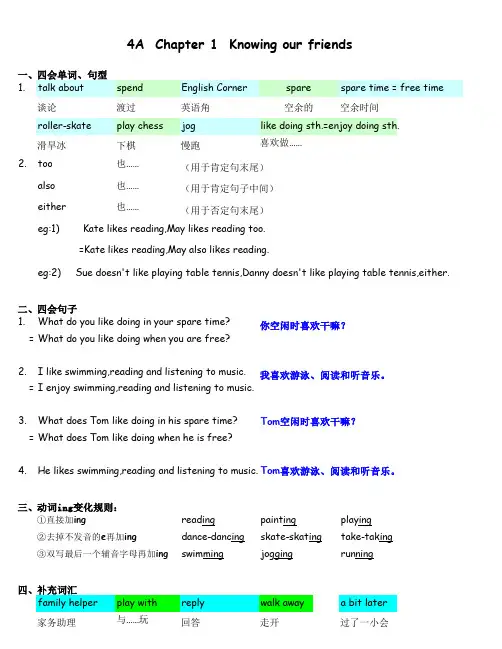
4A Chapter 1 Knowing our friends一、四会单词、句型1.talk about spend English Corner spare spare time = free time谈论 渡过英语角空余的空余时间roller-skate play chess jog like doing sth.=enjoy doing sth.滑旱冰下棋慢跑喜欢做……2.too也……(用于肯定句末尾)also也……(用于肯定句子中间)either也……(用于否定句末尾)eg:1) Kate likes reading,May likes reading too.=Kate likes reading,May also likes reading.eg:2) Sue doesn't like playing table tennis,Danny doesn't like playing table tennis,either.二、四会句子1.What do you like doing in your spare time?你空闲时喜欢干嘛?=What do you like doing when you are free?2.I like swimming,reading and listening to music.我喜欢游泳、阅读和听音乐。
=I enjoy swimming,reading and listening to music.3.What does Tom like doing in his spare time?Tom空闲时喜欢干嘛?=What does Tom like doing when he is free?4.He likes swimming,reading and listening to music.Tom喜欢游泳、阅读和听音乐。
三、动词ing变化规则:①直接加ing reading painting playing②去掉不发音的e再加ing dance-dancing skate-skating take-taking③双写最后一个辅音字母再加ing swimming jogging running四、补充词汇family helper play with reply walk away a bit later家务助理与……玩回答走开过了一小会solve puzzle sadly boring notes解决疑惑伤心地沉闷键盘piano slide swing钢琴滑梯秋千the youth center book dispiay central library 青少年活动中心书展中心图书馆sport centre City Hall city plaza体育活动中心市政厅市民广场4A Chapter 2 More about our friends一、四会单词和短语look after go to bed early late eat out get up 照顾,照看上床睡觉早迟外出用餐起床surf the Net play the recorder play the violin often sometimes always 上网吹直笛拉小提琴常常有时总是usually once twice never ever通常一次两次从不曾经二、三会单词polite same spilt(spill过去式)有礼貌相同的溢出angry invite friendly生气邀请友善的take photos cookbook wish拍照烹饪书希望三、四会句子1.Do you ever tidy your room?你曾经整理你的房间吗?yes,I usually tidy my room.是的,我经常整理我的房间。

香港朗文4A单词及句子4A Chapter 5 Animals big and small一、四会单词horse camel giraffe owl peacock wolf penguin 马骆驼长颈鹿猫头鹰孔雀狼企鹅eagle hippo turtle rat mouse(mice)crocodile parrot 鹰河马龟老鼠(较大)鼠鳄鱼鹦鹉二、三会单词shark dolphin starfish dragonfly cockroach鲨鱼海豚海星蜻蜓蟑螂insect ant crane golden-fish eel crab昆虫蚂蚁鹤金鱼鳗鱼螃蟹三、comparatives and superlatives of Adjectives: 形容词比较级和最高级1.规则变化:2.不规则变化:四、四会句子(Sentences)The rat is smaller than the rabbit.田鼠比兔子小。
The mouse is the smallest.老鼠最小。
The camel has a longer neck than the horse.骆驼的颈比马长。
The giraffe has the longest neck.长颈鹿的颈最长。
The penguin has pretty feathers.企鹅有漂亮的羽毛。
The parrot has prettier feathers than the penguin.鹦鹉比企鹅有更漂亮的羽毛。
The peacock has the prettiest feathers.孔雀有最漂亮的羽毛。
五、Verbs:(单词过去式)meet-met speak-spoke come-came swim-swam遇见讲话到来游泳break-broke save-saved choose-chose catch-caught 打破解救选择抓住become-became成为毛。
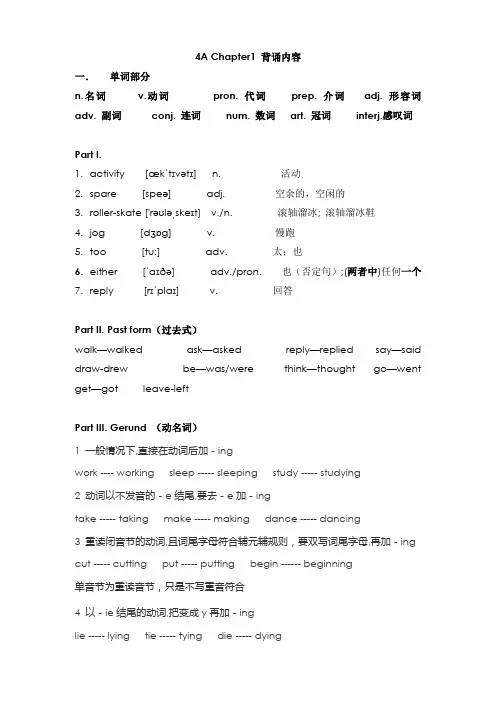
4A Chapter1 背诵内容一.单词部分n.名词v.动词pron. 代词prep. 介词adj. 形容词adv. 副词conj. 连词num. 数词art. 冠词interj.感叹词Part I.1.activity [ækˈtɪvətɪ] n. 活动2.spare [speə] adj. 空余的,空闲的3.roller-skate ['rəʊləˌskeɪt] v./n. 滚轴溜冰; 滚轴溜冰鞋4.jog [dʒɒg] v. 慢跑5.too [tu:] adv. 太;也6.either [ˈaɪðə] adv./pron. 也(否定句);(两者中)任何一个7.reply [rɪˈplaɪ] v. 回答Part II. Past form(过去式)walk—walked ask—asked reply—replied say—said draw-drew be—was/were think—thought go—went get—got leave-leftPart III. Gerund (动名词)1 一般情况下,直接在动词后加-ingwork ---- working sleep ----- sleeping study ----- studying2 动词以不发音的-e结尾,要去-e加-ingtake ----- taking make ----- making dance ----- dancing3 重读闭音节的动词,且词尾字母符合辅元辅规则,要双写词尾字母,再加-ing cut ----- cutting put ----- putting begin ------ beginning单音节为重读音节,只是不写重音符合4 以-ie结尾的动词,把变成y再加-inglie ----- lying tie ----- tying die ----- dying二.词组部分1.i n one’s spare time在某人的空余时间2.listen to (the) music 听音乐3.play chess 下棋4.like/love/enjoy doing 喜欢干某事5.go swimming (去)游泳6.go jogging (去)慢跑7.go roller-skating (去)溜冰8.be good at sth./doing 擅长于某事/干某事9.be poor at sth./doing 不擅长于某事/干某事10.be interested in sth./doing 对干某事/干某事感兴趣11.be afraid of sth./doing 害怕某事/干某事12.at/on the weekend 在周末at/on weekends13.on weekdays 在工作日14.be busy with sth. 忙于某事15.be busy doing 忙于干某事16.enjoy oneself= have a good time 某人玩得很开心17.a family helper 一位家庭帮手18.pick up kids 接小孩19.play the piano/violin 弹钢琴,拉小提琴(西洋乐器名词前加the )20.play Erhu 拉二胡(民族乐器前无the)21.play table tennis 打羽毛球(球类名词前无the)22.play on the swing/slide 在秋千(滑滑梯)上玩23.play with sb. 与某人一起玩24.play with sth. 玩耍某物25.a bit later 一会儿以后26.walk away sadly 难过地走开了27.walk the dog 溜狗28.walk home=go home on foot 走回家29.go home =go back home 回家30.after that 在那以后31.the black notes (钢琴上)黑键32.see sb. doing 看到某人在干某事33.make a new friend named Tom 交了一个叫汤姆的朋友34.in fact = actually/ˈæktʃʊəlɪ/事实上35.in the gym 在体育馆36.indoor stadium /'steɪdɪəm/ 室内体育馆37.finish sth./doing sth. 完成某事/干某事38.be important to sb. 对某人而言是重要的(绿色字体部分为拓展内容,供学有余力的小朋友默写。
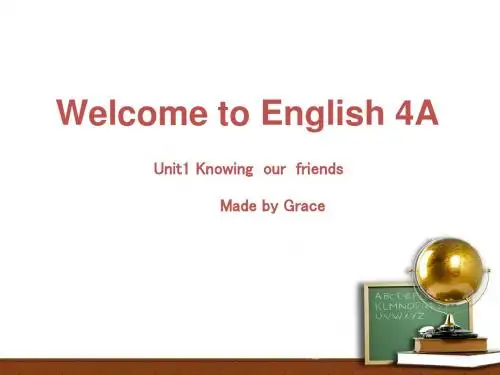
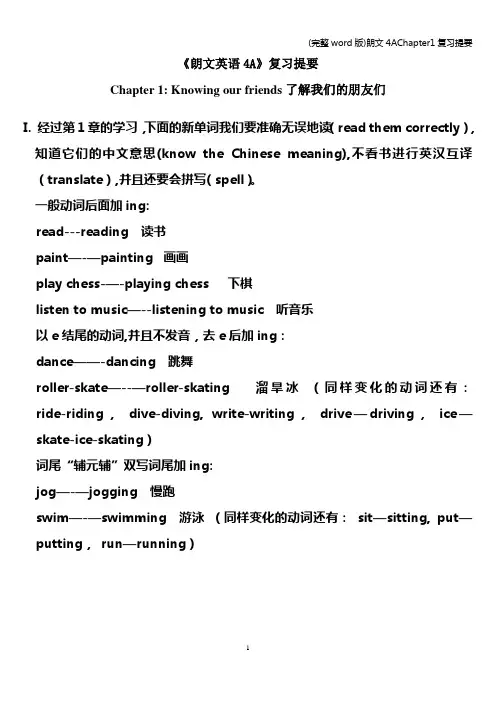
《朗文英语4A》复习提要Chapter 1: Knowing our friends了解我们的朋友们I. 经过第1章的学习,下面的新单词我们要准确无误地读(read them correctly),知道它们的中文意思(know the Chinese meaning),不看书进行英汉互译(translate),并且还要会拼写( spell)。
一般动词后面加ing:read---reading 读书paint—-—painting 画画play chess-—-playing chess 下棋listen to music—--listening to music 听音乐以e结尾的动词,并且不发音,去e后加ing:dance——-dancing 跳舞roller-skate—--—roller-skating 溜旱冰(同样变化的动词还有:ride-riding,dive-diving, write-writing,drive—driving,ice—skate-ice-skating)词尾“辅元辅”双写词尾加ing:jog—-—jogging 慢跑swim—-—swimming 游泳(同样变化的动词还有:sit—sitting, put—putting,run—running)II。
句型:like +doing喜欢做某事下面的关键句型我们要会读(read), 知道意思(know the Chinese meaning), 会根据不同的语境来运用(use them in different contexts), 会写(write them correctly)。
English corner英语角(在英语角我们用英语交流,是练习英语口语的地方)in your spare time 在你的空闲时间= when you are free 当你空闲时1。
—--What do you like doing in your spare time?-——I like swimming, reading and listening to music。
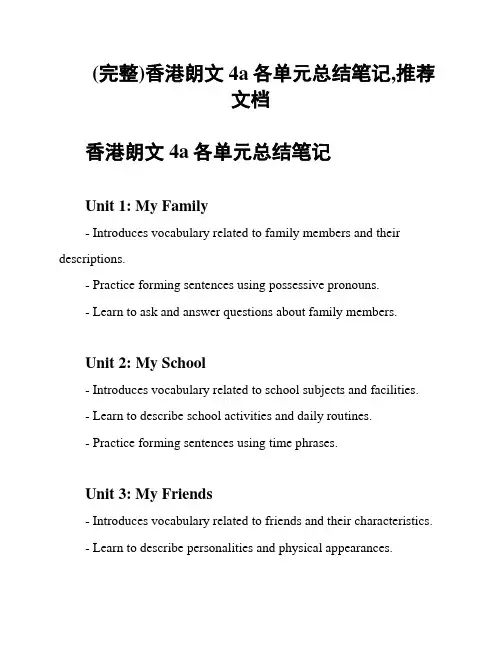
(完整)香港朗文4a各单元总结笔记,推荐文档香港朗文4a各单元总结笔记Unit 1: My Family- Introduces vocabulary related to family members and their descriptions.- Practice forming sentences using possessive pronouns.- Learn to ask and answer questions about family members.Unit 2: My School- Introduces vocabulary related to school subjects and facilities.- Learn to describe school activities and daily routines.- Practice forming sentences using time phrases.Unit 3: My Friends- Introduces vocabulary related to friends and their characteristics.- Learn to describe personalities and physical appearances.Unit 4: My Hobbies- Introduces vocabulary related to hobbies and leisure activities.- Learn to express preferences and interests.- Practice forming sentences using the present continuous tense.Unit 5: My City- Introduces vocabulary related to places in a city.- Practice giving directions and talking about locations.- Learn to use prepositions of place.Unit 6: My Country- Introduces vocabulary related to countries, nationalities, and cultures.- Learn to talk about countries' landscapes and traditions.- Practice using adjectives to describe places.Unit 7: My Holidays- Introduces vocabulary related to holidays and celebrations.- Learn to describe past experiences and talk about future plans.- Practice using past simple and future tenses.Unit 8: My Future- Introduces vocabulary related to dream jobs and future aspirations.- Learn to express hopes and ambitions.- Practice forming sentences using modal verbs.这个文档总结了香港朗文4a课程的各个单元内容,包括所学词汇、语法和句型。
各单元汇总报告1.重点语法和单词:2.重点句型:() –?,() .() ’.() ’.3.重点词组:4.动词的过去式1.重点语法和单词:2.重点句型:() ?, .()—?, ., ’.3.重点词组:4.动词的过去式1.重点语法:2.重点单词和词组:3.重点句型:(1)?-, .(2).(3)?(4)–?, .()—?, ’. ’. ( ) –?, ’. ’.() –?, ’. ’. () –?, .(哪里)?(如何)?(多少钱,提问不可数名词) ? . (多少,提问可数名词)?(什么时间)?(什么)? .(什么)? ’ .(什么颜色) ? .(什么) ? ( ?) .(什么时候)?(多大) ? .(谁) ? .(哪一个)?(为什么) ..重点单词和词组:.动词过去式:.重点句型(1)?——. (2)?——. (3)? (4)’动词原形(5)?——...... . (6)?——’.:.重点单词词组2.单词过去式.形容词比较级最高级.重点句型(), ... (2)’.:.重点单词和词组.形容词比较级最高级.重点句型..().(动词原形)(3)’?——, ’ .(4)? ——’..单词词组汇总.过去式.重点句型()’ ?——.——...... (3)?——. (4)? ——.......。
(完整word版)香港朗文4A总结U1-U74A各单元总结Unit One1.重点语法和单词:Read --reading Paint--painting Dance--dancing Roller-skate—roller-skating Jog--jogging Swim--swimming Play--playing Listen--listening Walk--walking Draw--drawing Go--going2.重点句型:(1) –What do you like doing?-- I like swimming, reading and listening to music(2) I like reading too.(3) I don’t like playing table tenniseither.-skating.(4) Let’s go ice3.重点词组:like doing in your spare timeplay table tennis play with sb.play on the swings play on the slideI’m busy.draw a trainwalk away walk the doglook at play the pianogo ice-skating4.动词的过去式Are--were Ask—askedSay—said Reply—repliedGet—got Walk--walkedLeave--leftGo—wentThink--thoughtUnit two1.重点语法和单词:Always Usually OftenSometimes Never2.重点句型:(1)--Do you ever tidy your room?-- Yes, I usually tidy my room.(2)—Does she ever play the violin?-- No, she never plays the violin.-- No, she doesn’t play the violin.3.重点词组:look after your pets go to bed earlytidy your room eat outget up late surf the Netget angry talk to sb.take photos invite sb. to one’s homeam/is/are good at something show one around look around go into the dining roomenjoy the meal play a lot of musicplay the recorder play the pianoplay the violin play a lot of sportplay pingpong play table tennisplay football watch football matches4.动词的过去式say—said talk—talkedcan—could ask--askedthink—thought show--showedhave—had call—calledwill--would enjoy--enjoyedspill—spilled/spilttake--tookgo--wentUnit Three1.重点语法:am/is/are--was are--were ask--asked like--likedfly--flew make--made flick--flicked want--wantedcatch--caught draw—drew stay--stayed happen--happened put--put say--said Play--playedhave/has--had hit--hitkeep--kept go--wentlose--lost do--didwin--won2.重点单词和词组:cola fast food CDscomics clocks air-consmobile-phones rickshaw an oil lampclogs camera fanstove play computer games fly kitesplay hopscotch make nets catch butterfliesplay marbles draw a circle on the groundgo out of the circle want to +动词原形flick the shooter into thecirclego out a lot of credit cardswear trainers have telephones check your answerask someone3.重点句型:(1)--Was there any cola when you were young?-Yes, there was.(2)The game I like best was marbles.(3)How do you play marbles?(4)– Did you wear trainers fifty years ago?--Yes, I did.(5)—Did you have a telephone?-- No, I didn’t. Rich people had telephones at home but poor people didn’t.(6 ) – Did you shop at the supermarket?--- No, I didn’t. There weren’t any supermarkets.(7) – Did you go to school?-- No, I didn’t. Rich children go to school but poor children didn’t.(8) –Did you listen to the radio?-- Yes, I did.Where(哪里)do you like going to in your holiday?How(如何)do you help at home?How much (多少钱,提问不可数名词)is it? --- It is five dollars.How many (多少,提问可数名词)books in your home?What time(什么时间)is it?What(什么)are you doing now? ----I am doing my homework.What(什么)is the weather like today? ----It’s windy.What color (什么颜色)is it? ---- It is red.What (什么)are you? ( What do you do?) -----I am a driver.When(什么时候)is your birthday? ---on 2nd MayHow old(多大)are you? ----I am ten.Who (谁) are you? -----I am David.Which(哪一个) club do you want to join?Why(为什么)do you like playing football?----Because I like being healthy.Unit Four1.重点单词和词组:cotton clothes silk clothes a horse a sedan chair silver and gold paper money a village a town do one’s homework feel sleepy after a while fall asleep strange friendly missWhy don’t you post office explain suddenly wake upcelebrate cook with firewood Ride horses Travel by sedan chair Chinese NewYearTravel by boat Send letters Rich people supermarket Cook with gasLook tired This is fun Live in flats Keep in touch with Be away fromhome2.动词过去式:wear—wore ride—rode travel—travelled walk—walked feel—felt take—took miss—missed write—wrote explain—explained wake—woke3.重点句型(1)How did people travel?——Most/Rich/Some people travelled by boat/sedan chair.(2)What did people wear?——Most/Rich people wore cotton clothes/silk clothes.(3)May I use your phone?(4)Why don’t you+动词原形(5)How do you want to send your letter?——By...... .(6)Were there any supermarkets?——No,there weren’t.Unit Five:1.重点单词词组science museum a horse a camel a giraffe an owla peacock an eagle a hippo leader come forwardwise look after talk about eel sharkdolphin starfish crab come down breakdirection scary feather noisy hairy tiny wolf crocodile penguin parrotbee fly cockroach shiny silver2.单词过去式meet—met come—came say—said speak—spoke catch—caughtswim—swam shout—shouted break—broke save—saved3.形容词比较级最高级Tall-taller-tallest Heavy-heavier-heaviestBig-bigger-biggest Small-smaller-smallest Pretty-prettier-prettiestFast-faster-fastest Strong-stronger-strongestGood-better-best Long-longer-longest4.重点句型(1)The horse, the camel and the giraffe are tall.The camel is taller than the horse.The giraffe is the tallest.(2)I’m stronger than all of you.Unit Six:1.重点单词和词组villages islands temples crocodiles snakesa boat trip a camel trip a helicopter trip a waterfall a rivera cave at the beach proud powerful show offshow sb around country politely an hour a thick jungle different plant huge later fly overmountain dangerous fantastic too tired at the beginningof restaurant activity enjoyable exciting wonderful2.形容词比较级最高级interesting-more interesting-the most interesting exciting-more exciting-themost excitingpowerful-more powerful-themost powerfulbeautiful-more beautiful-the most beautifuldangerous-more dangerous-the most dangeroushigh-higher-highest nice-nicer-nicest wide-wider-widest light-lighter-lightest3.重点句型(1)We visited some interesting places.The villages were more interesting than the temples.The islands were the most interesting.(2)Let me show you around my country.Let sb +do(动词原形)(3)Isn’t it big?——Yes, it’s huge.(4)Are we near your home yet?——Oh,no.It’s still a long way away.Unit Seven1.单词词组汇总learn a lesson character list forest insect busyquickly slowly work hard collect build a newhomebright light up path naughty loudlysoftly match carefully careless Don’t worry drop burn down be afraid of warn Look out get away speak angrily steal dirty rubbish bin clean up stranger fly off2.过去式light—lighted(lit)drop—dropped burn—burned steal—stole fly—flew happen—happenedstart—started try—tried get—got3.重点句型(1)The insects are busy today,aren’t they?——Yes,they are.(2)What are they?——They are......(3)Did you steal the matches?——Yes,I did.(4)Why did you fly off with the burning match?——Because I.......。
4A各单元总结Unit One
1.
2.重点句型:
(1) –What do you like doing?
-- I like swimming, reading and listening to music
(2) I like reading too.
(3) I don’t like playing table tennis either.
(4) Let’s go ice-skating.
3.
4.
Unit two
1.
2.重点句型:
(1)--Do you ever tidy your room?
-- Yes, I usually tidy my room.
(2)—Does she ever play the violin?
-- No, she never plays the violin.
-- No, she doesn’t play the violin.
3.
4.
Unit Three 1.
2.
3.
(1)--Was there any cola when you were young?
-Yes, there was.
(2)The game I like best was marbles.
(3)How do you play marbles?
(4)– Did you wear trainers fifty years ago?
--Yes, I did.
(5)—Did you have a telephone?
-- No, I didn’t. Rich people had telephones at home but poor people didn’t.
(6 ) – Did you shop at the supermarket?
--- No, I didn’t. There weren’t any supermarkets.
(7) – Did you go to school?
-- No, I didn’t. Rich children go to school but poor children didn’t.
(8) –Did you listen to the radio?
-- Yes, I did.
Where(哪里)do you like going to in your holiday?
How(如何)do you help at home?
How much (多少钱,提问不可数名词)is it? --- It is five dollars. How many (多少,提问可数名词)books in your home?
What time(什么时间)is it?
What(什么)are you doing now? ----I am doing my homework. What(什么)is the weather like today? ----It’s windy.
What color (什么颜色)is it? ---- It is red.
What (什么)are you? ( What do you do?) -----I am a driver.
When(什么时候)is your birthday? ---on 2nd May
How old(多大)are you? ----I am ten.
Who (谁) are you? -----I am David.
Which(哪一个) club do you want to join?
Why(为什么)do you like playing football?----Because I like being healthy.
Unit Four
3.重点句型
(1)How did people travel?
——Most/Rich/Some people travelled by boat/sedan chair.(2)What did people wear?
——Most/Rich people wore cotton clothes/silk clothes.(3)May I use your phone?
(4)Why don’t you+动词原形
(5)How do you want to send your letter?
——By...... .
(6)Were there any supermarkets?
——No,there weren’t.
Unit Five:
4.重点句型
(1)The horse, the camel and the giraffe are tall.
The camel is taller than the horse.
The giraffe is the tallest.
(2)I’m stronger than all of you.
Unit Six:
3.重点句型
(1)We visited some interesting places.
The villages were more interesting than the temples.
The islands were the most interesting.
(2)Let me show you around my country.
Let sb +do(动词原形)
(3)Isn’t it big?
——Yes, it’s huge.
(4)Are we near your home yet?
——Oh,no.It’s still a long way away.
Unit Seven
3.重点句型
(1)The insects are busy today,aren’t they?
——Yes,they are.
(2)What are they?
——They are......
(3)Did you steal the matches?
——Yes,I did.
(4)Why did you fly off with the burning match?
——Because I.......。